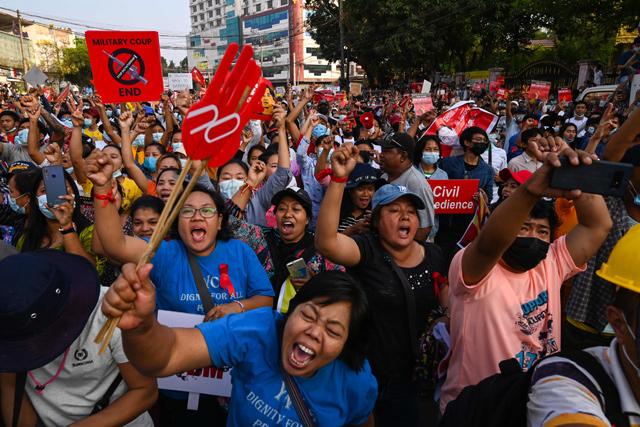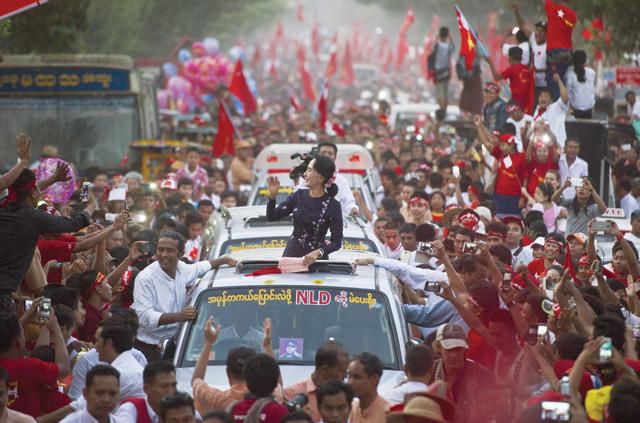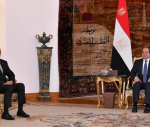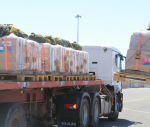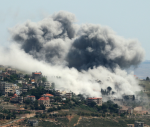You are here
Myanmar military raids Suu Kyi’s party offices as US, UN slam violence
By AFP - Feb 09,2021 - Last updated at Feb 09,2021
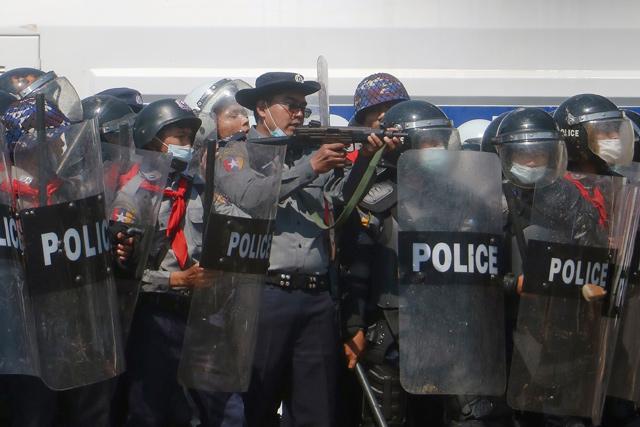
A police officer (centre) aims a gun during clashes with protesters taking part in a demonstration against the military coup in Naypyidaw, on Tuesday (AFP photo)
YANGON — Myanmar’s military raided the Yangon headquarters of ousted leader Aung San Suu Kyi’s party late Tuesday, officials said, as the United States joined the UN in “strongly” condemning violence against protesters demanding a return to democracy.
The latest assault on Myanmar’s civilian leadership came as anger at last week’s coup and the detention of Suu Kyi by the generals has driven hundreds of thousands of people into the streets, defying a junta ban on rallies.
“The military dictator raided and destroyed NLD headquarters at around 9:30pm,” the National League for Democracy (NLD) announced on its Facebook page.
The party’s short statement gave no further details.
The raid came after demonstrations erupted for a fourth straight day on Tuesday, with police using water cannons in several cities, firing rubber bullets at protesters in the capital Naypyidaw and deploying tear gas in Mandalay.
The rallies came despite a warning from the junta that it would take action against demonstrations that threatened “stability”, and a new ban on gatherings of more than five people.
The United States, which has led global censure of the coup, issued a fresh statement on Tuesday renewing a call for freedom of expression in Myanmar.
“We strongly condemn violence against demonstrators,” US State Department spokesman Ned Price told reporters, adding that people in Myanmar “have rights to peaceful assembly”.
Price has previously said US requests to speak to Suu Kyi had been denied.
Two shot
As night fell the United Nations also voiced its “strong concern” over the violence.
“The use of disproportionate force against demonstrators is unacceptable,” said Ola Almgren, the UN resident coordinator and humanitarian coordinator in Myanmar.
In Naypyidaw, the remote capital purpose-built by the previous military regime, witnesses said police fired projectiles at protesters after earlier blasting them with water cannon.
“They fired warning shots to the sky two times, then they fired [at protesters] with rubber bullets,” a resident told AFP.
At least one emergency room doctor said the military were also using live rounds, leaving a 23-year-old man and 19-year-old in a critical condition in hospital.
“We believe they are actual bullets because of the wounds and their injuries,” the doctor said.
“We don’t operate on their wounds because they could die right away — we are 100 per cent sure they will die if we operate — that’s why we are watching their condition by treating them medically.”
The father of one of the victims said his son had been shot “when he tried to use the megaphone to ask people to protest peacefully after the police used water cannon to disperse them”.
“He got hit in the back... I’m very worried about him,” the 56-year-old goldsmith told AFP.
In Mandalay, the country’s second-biggest city, police fired tear gas to disperse protesters.
‘We only have one life’
A witness, who declined to be named out of fear of the authorities, said she gave shelter to about 20 of the protesters, offering them water, towels and fresh face masks.
Earlier this week the protests by hundreds of thousands appeared to have rattled the military, with junta chief General Min Aung Hlaing making a televised speech Monday to justify seizing power, citing fraud claims.
The army also announced a curfew and a ban on protest gatherings.
But on Tuesday fresh demonstrations emerged in Yangon, including near the NLD’s headquarters.
The protesters carried placards, some of which read “We want our leader”, in reference to Suu Kyi and “No dictatorship”.
By afternoon, thousands had gathered in neighbouring Kamayut township, carrying umbrellas and wearing raincoats as they faced off against police, who had water cannon trucks blocking protesters from marching ahead.
“Of course we are worried [about a crackdown],” said protester Khin Thida Nyein, a teacher. “We only have one life but we still come out... as we are more concerned for the future of our children.”
Protesters dispersed by nightfall, with no reports of clashes with Yangon authorities.
Meanwhile, civil aviation workers and air traffic controllers have joined a civil disobedience movement, with their strike set to impact international flights wanting to pass through Myanmar’s air space.
Military promises
It will also hit the military government’s coffers, which are set to lose overflight fees paid by airlines that could be worth up to $182,000 per day.
“Without us they can’t get the money anymore,” one air traffic controller told AFP.
The NLD won last November’s national elections by a landslide but the military never accepted the results.
It has announced a one-year state of emergency and promised to hold fresh elections after that.
Min Aung Hlaing on Monday insisted the military would abide by its promises and reinstall democracy. He also declared that things would be different from the army’s previous 49-year reign, which ended in 2011.
New Zealand on Tuesday became the first foreign government to take concrete public action, announcing the suspension of high-level military and political contacts with Myanmar.
The UN Human Rights Council said it would hold a relatively rare special session on Friday to discuss the crisis.
Meanwhile, relatives of an Australian economic advisor to Suu Kyi said they were “distraught” over his detention.
Macquarie University professor Sean Turnell was the first foreign national confirmed arrested by the new junta.
Australian Foreign Minister Marise Payne has summoned the Myanmar ambassador over the case.
Related Articles
YANGON — Myanmar’s junta deployed extra troops around the country and choked the Internet on Monday as it intensified a crackdown on anti-co
YANGON — Martial law was declared in parts of Myanmar's second largest city Mandalay on Monday, after hundreds of thousands rallied across t
YANGON — The party of Myanmar's toppled leader Aung San Suu Kyi demanded her immediate release Tuesday, after a military coup that triggered


